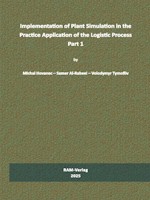Campus Licence Campuslizenz
|
|
 |
Introduction
The primary objective of this research is to enhance logistics safety and efficiency through the integration of digital risk manage-ment tools and simulation modeling. The study focuses on impro-ving risk assessment methodologies, optimizing transport routes, and ensuring food safety compliance in logistics operations. By utili-zing Siemens Tecnomatix Plant Simulation software, the research aims to develop a scalable and adaptable framework for managing risks in transport networks, particularly in the Slovak context.
The increasing complexity of transport logistics, combined with new challenges such as pandemic-induced disruptions, requires a thorough risk assessment. This study aims to analyze major risks in road, rail, and air transport, with a particular focus on Slovakia’s logistics networks. Special attention is given to biological and conta-mination risks in food transport, which necessitate compliance with HACCP and ISO 22000 standards.
Digitalization has become an essential tool for improving logistics safety and efficiency. This study explores the role of digital transformation in risk management, including real-time monitoring, big data analytics, and mapping tools for predictive risk modeling. The evaluation of existing digital platforms will help determine their effectiveness in enhancing resilience within transport networks.
Simulation modeling plays a crucial role in optimizing logi-stics operations. This research focuses on using Siemens Tecno-matix Plant Simulation software to develop case studies and assess risk mitigation strategies. By creating digital models of transport processes, this study seeks to identify bottlenecks, improve transport efficiency, and test various logistics scenarios.
The COVID-19 pandemic highlighted the vulnerabilities in supply chains, border restrictions, and emergency transport regula-tions. This study examines how logistics adapted during the pan-demic and evaluates strategies such as automated disinfection solute-ons at airports. The research aims to propose a scalable frame-work that enhances crisis resilience in transport logistics.
By integrating these objectives, the study seeks to provide a comprehensive approach to modern risk management in logistics,
combining traditional safety measures with advanced digital solute-ons to enhance transport efficiency and resilience.
Figure 1 presents a flowchart that reflects the comprehensive research methodology used in this study. At the core of the diagram is the overarching concept of Research Methodology, which branches into five interrelated components.
The first segment focuses on the Literature Review and Theoretical Framework, where the study explores key components such as the role of international standards in logistics regulation and practices in risk assessment and management. This section establis-hes the theoretical underpinnings necessary to frame the subsequent methodological approaches.
The second component addresses Food Safety Management, emphasizing compliance with established frameworks such as ISO 22000 and HACCP. This section outlines how these standards con-tribute to the assurance of food safety throughout logistics opera-tions.
The third section details the Data Collection and Analysis phase, which involves gathering real-world logistics data, including transport schedules and risk assessments. Additionally, a compara-tive study is conducted to identify and evaluate suitable software tools for logistics applications.

